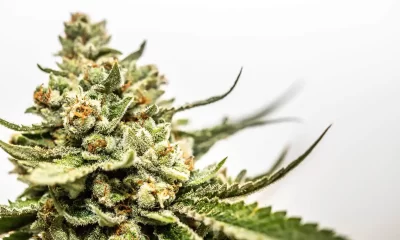Business
82-Year-Old German Pot Dealer Gets ‘Very Last Warning’

The unidentified German seaman has previously been convicted 24 times; all he wanted to do was improve his monthly pension.
One octogenarian German is down to his last straw.
The Associated Press reports that a court in the northern German town of Aurich “has given an 82-year-old man a ‘last warning’ to avoid jail after he was found guilty of drug dealing, despite 24 previous convictions.”
The defendant, identified only as a retired seaman, reportedly “said he wanted to improve his meagre €800 (£690) monthly pension by selling marijuana,” and “was handed a suspended sentence” by the court in Aurich.
The AP, citing German news agency dpa, reported “that prosecutors had asked the court to impose a prison term of 34 months in view of the man’s lengthy criminal record and an existing suspended sentence,” but judges “said they would make an exception and classify the latest crimes as ‘less serious offences’ because of the man’s particular circumstances and recent health problems.”
“Dpa quoted the presiding judge telling the defendant that it was his ‘very last warning,’” according to the Associated Press.
In recent years, Germany has emerged as a major focal point in Europe’s debate over cannabis legalization.
Following the country’s election in 2021, when the center-left Social Democrats Party (SPD) received the most votes, the party formed a coalition with the Green Party and the Free Democrats (FDP) to establish a new government. Coalition leaders said immediately that they would pursue marijuana legalization.
“We’re introducing the controlled distribution of cannabis to adults for consumption in licensed stores,” a spokesperson for the coalition said at the time. “This will control the quality, prevent the transfer of contaminated substances and guarantee the protection of minors. We will evaluate the law after four years for social impact.”
Earlier this year, German leaders unveiled the scope of their legalization plans, which were decidedly narrower from their original vision.
In April, the government “presented scaled-back plans…to liberalize the country’s rules on cannabis, including by decriminalizing possession of limited amounts and allowing members of nonprofit ‘cannabis clubs’ to buy marijuana for recreational purposes,” the Associated Press reported at the time.
“In a second step, German officials also envision setting up regional test projects to sell cannabis through ‘commercial supply chains,’ Health Minister Karl Lauterbach said. But the proposal differs from one he presented in October, which foresaw allowing the sale of cannabis to adults across the country at licensed outlets,” the AP continued. “The German government revised the plan following talks with the European Union’s executive commission. Agriculture Minister Cem Özdemir said EU law ‘sets us limits we must respect, but that I will also say we are pushing.’ Lauterbach had cautioned all along that the government would only proceed with its original plan if it got the green light from the EU.”
The proposed new cannabis law “foresees legalizing the possession of up to 25 grams (nearly 1 ounce) of cannabis for recreational purposes and allowing individuals to grow up to three plants,” according to the Associated Press, which noted that the measure would “let German residents 18 and older join nonprofit ‘cannabis clubs’ with a maximum 500 members each, which would be allowed to grow cannabis for members’ personal consumption.,” while individuals “would be allowed to buy up to 25 grams per day, or up to 50 grams per month — a figure that would be limited to 30 grams for adults under age 21.”
Lauterbach said in April that the reaction from the EU was “on the one hand, something that perhaps disappointed us, but on the other hand also an opportunity — the opportunity to build the basis for a European cannabis policy with a well-conducted study.”
Source: https://hightimes.com/news/82-year-old-german-pot-dealer-gets-very-last-warning/
Business
New Mexico cannabis operator fined, loses license for alleged BioTrack fraud

New Mexico regulators fined a cannabis operator nearly $300,000 and revoked its license after the company allegedly created fake reports in the state’s traceability software.
The New Mexico Cannabis Control Division (CCD) accused marijuana manufacturer and retailer Golden Roots of 11 violations, according to Albuquerque Business First.
Golden Roots operates the The Cannabis Revolution Dispensary.
The majority of the violations are related to the Albuquerque company’s improper use of BioTrack, which has been New Mexico’s track-and-trace vendor since 2015.
The CCD alleges Golden Roots reported marijuana production only two months after it had received its vertically integrated license, according to Albuquerque Business First.
Because cannabis takes longer than two months to be cultivated, the CCD was suspicious of the report.
After inspecting the company’s premises, the CCD alleged Golden Roots reported cultivation, transportation and sales in BioTrack but wasn’t able to provide officers who inspected the site evidence that the operator was cultivating cannabis.
In April, the CCD revoked Golden Roots’ license and issued a $10,000 fine, according to the news outlet.
The company requested a hearing, which the regulator scheduled for Sept. 1.
At the hearing, the CCD testified that the company’s dried-cannabis weights in BioTrack were suspicious because they didn’t seem to accurately reflect how much weight marijuana loses as it dries.
Company employees also poorly accounted for why they were making adjustments in the system of up to 24 pounds of cannabis, making comments such as “bad” or “mistake” in the software, Albuquerque Business First reported.
Golden Roots was fined $298,972.05 – the amount regulators allege the company made selling products that weren’t properly accounted for in BioTrack.
The CCD has been cracking down on cannabis operators accused of selling products procured from out-of-state or not grown legally:
- Regulators alleged in August that Albuquerque dispensary Sawmill Sweet Leaf sold out-of-state products and didn’t have a license for extraction.
- Paradise Exotics Distro lost its license in July after regulators alleged the company sold products made in California.
Golden Roots was the first alleged rulebreaker in New Mexico to be asked to pay a large fine.
Source: https://mjbizdaily.com/new-mexico-cannabis-operator-fined-loses-license-for-alleged-biotrack-fraud/
Business
Marijuana companies suing US attorney general in federal prohibition challenge

Four marijuana companies, including a multistate operator, have filed a lawsuit against U.S. Attorney General Merrick Garland in which they allege the federal MJ prohibition under the Controlled Substances Act is no longer constitutional.
According to the complaint, filed Thursday in U.S. District Court in Massachusetts, retailer Canna Provisions, Treevit delivery service CEO Gyasi Sellers, cultivator Wiseacre Farm and MSO Verano Holdings Corp. are all harmed by “the federal government’s unconstitutional ban on cultivating, manufacturing, distributing, or possessing intrastate marijuana.”
Verano is headquartered in Chicago but has operations in Massachusetts; the other three operators are based in Massachusetts.
The lawsuit seeks a ruling that the “Controlled Substances Act is unconstitutional as applied to the intrastate cultivation, manufacture, possession, and distribution of marijuana pursuant to state law.”
The companies want the case to go before the U.S. Supreme Court.
They hired prominent law firm Boies Schiller Flexner to represent them.
The New York-based firm’s principal is David Boies, whose former clients include Microsoft, former presidential candidate Al Gore and Elizabeth Holmes’ disgraced startup Theranos.
Similar challenges to the federal Controlled Substances Act (CSA) have failed.
One such challenge led to a landmark Supreme Court decision in 2005.
In Gonzalez vs. Raich, the highest court in the United States ruled in a 6-3 decision that the commerce clause of the U.S. Constitution gave Congress the power to outlaw marijuana federally, even though state laws allow the cultivation and sale of cannabis.
In the 18 years since that ruling, 23 states and the District of Columbia have legalized adult-use marijuana and the federal government has allowed a multibillion-dollar cannabis industry to thrive.
Since both Congress and the U.S. Department of Justice, currently headed by Garland, have declined to intervene in state-licensed marijuana markets, the key facts that led to the Supreme Court’s 2005 ruling “no longer apply,” Boies said in a statement Thursday.
“The Supreme Court has since made clear that the federal government lacks the authority to regulate purely intrastate commerce,” Boies said.
“Moreover, the facts on which those precedents are based are no longer true.”
Verano President Darren Weiss said in a statement the company is “prepared to bring this case all the way to the Supreme Court in order to align federal law with how Congress has acted for years.”
While the Biden administration’s push to reschedule marijuana would help solve marijuana operators’ federal tax woes, neither rescheduling nor modest Congressional reforms such as the SAFER Banking Act “solve the fundamental issue,” Weiss added.
“The application of the CSA to lawful state-run cannabis business is an unconstitutional overreach on state sovereignty that has led to decades of harm, failed businesses, lost jobs, and unsafe working conditions.”
Business
Alabama to make another attempt Dec. 1 to award medical cannabis licenses

Alabama regulators are targeting Dec. 1 to award the first batch of medical cannabis business licenses after the agency’s first two attempts were scrapped because of scoring errors and litigation.
The first licenses will be awarded to individual cultivators, delivery providers, processors, dispensaries and state testing labs, according to the Alabama Medical Cannabis Commission (AMCC).
Then, on Dec. 12, the AMCC will award licenses for vertically integrated operations, a designation set primarily for multistate operators.
Licenses are expected to be handed out 28 days after they have been awarded, so MMJ production could begin in early January, according to the Alabama Daily News.
That means MMJ products could be available for patients around early March, an AMCC spokesperson told the media outlet.
Regulators initially awarded 21 business licenses in June, only to void them after applicants alleged inconsistencies with how the applications were scored.
Then, in August, the state awarded 24 different licenses – 19 went to June recipients – only to reverse themselves again and scratch those licenses after spurned applicants filed lawsuits.
A state judge dismissed a lawsuit filed by Chicago-based MSO Verano Holdings Corp., but another lawsuit is pending.
Source: https://mjbizdaily.com/alabama-plans-to-award-medical-cannabis-licenses-dec-1/
-

 Business2 years ago
Business2 years agoPot Odor Does Not Justify Probable Cause for Vehicle Searches, Minnesota Court Affirms
-

 Business2 years ago
Business2 years agoNew Mexico cannabis operator fined, loses license for alleged BioTrack fraud
-

 Business2 years ago
Business2 years agoAlabama to make another attempt Dec. 1 to award medical cannabis licenses
-

 Business2 years ago
Business2 years agoWashington State Pays Out $9.4 Million in Refunds Relating to Drug Convictions
-

 Business2 years ago
Business2 years agoMarijuana companies suing US attorney general in federal prohibition challenge
-

 Business2 years ago
Business2 years agoLegal Marijuana Handed A Nothing Burger From NY State
-

 Business2 years ago
Business2 years agoCan Cannabis Help Seasonal Depression
-

 Blogs2 years ago
Blogs2 years agoCannabis Art Is Flourishing On Etsy













